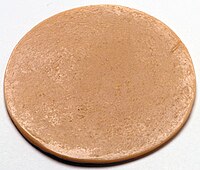

This article has multiple issues. Please help improve it or discuss these issues on the talk page. (Learn how and when to remove these template messages)
|

Devon (also known by many other names) is a type of manufactured meat product sold in Australia and New Zealand.
Typical commercial preparations list the major ingredient as "meat including pork". It is usually composed of several types of pork, basic spices, and a binder.
It is considered to be a cheap meat product[1] and is sold in the deli section of supermarkets.
It is usually served in a sandwich, often with tomato sauce,[2] and can also be fried in slices.
Devon would be classed as "luncheon meat" in the UK[1] or a "cold cut" in the USA.
The product is known by a variety of names in different regions of Australia and New Zealand:[3]
Originally known in some parts of Australia as "German sausage", this name fell out of favour during World War I when Australia was at war with Germany. 'Veal German' is another facsimile. It is similar in appearance and taste to the bologna sausage and the cooked pork sausage known in Australia as Berliner.[1]
Though similar in usage and appearance, South Australians maintain that devon is not in fact related to the South Australian "bung fritz", which is manufactured using a process and recipe entirely unique to South Australia, particularly in the use of the sheep's appendix (known as the bung, where bung fritz gets the name).[4]
It may be referred to as Strass, from the word Strassburg, though this term is usually associated with another style of processed meat roll characterised by a waxy red 'skin' and fat-mottled, chunkier texture.
|
| |||||
|---|---|---|---|---|---|
| Overview |
| ||||
| Fresh sausage |
| ||||
| Dry sausage |
| ||||
| Smoked sausage |
| ||||
| Cooked sausage |
| ||||
| Cooked smoked sausage |
| ||||
| Precooked sausage |
| ||||
| Grilled sausage |
| ||||
| Related articles |
| ||||
| |||||